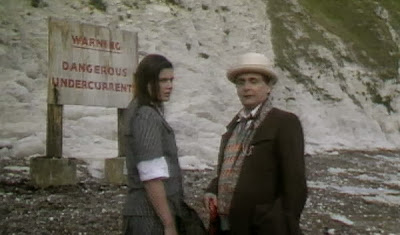The TARDIS intercepts a Time Lord “communication cube” (first seen in “The War Games”), and the Doctor (Matt Smith) is jubilant because it means another survivor of his race could be alive out there somewhere.
With Amy (Karen Gillan) and Rory (Arthur Darvill) in tow, The Doctor follows the cube’s trail outside the universe itself, to a pocket universe.
There, unfortunately, a trap awaits them all.
A dark force that consumes TARDISes has been luring Time Lords to a junkyard planet for generations. The same dark force assumes control of the Doctor’s TARDIS, but deposits the ship’s soul (or consciousness) inside a humanoid woman, Idris.
Then, the beast strands the Doctor on the planet, and heads back into the proper universe…to wreak havoc.
Now, the Doctor must team with Idris (Suranne Jones) -- the very soul of the TARDIS -- to build a “junk” TARDIS, escape from the pocket universe, and rescue Amy and Rory from the sinister and sadistic alien intelligence now controlling their every breath…
With over two-hundred stories already in its roster, Doctor Who continues to surprise and delight with the remarkable, emotionally-affecting, and unexpected “The Doctor’s Wife.” Here, in the modern days of Matt Smith’s Era, the series turns every standing franchise precept upside-down and provides an entirely fresh perspective on the Whoniverse.
The tale’s premise, in brief, is that the TARDIS Matrix gets put inside a human body and can suddenly tell the Doctor’s story from its own unique perspective.
The TARDIS stole the Doctor, not vice-versa, for example.
And she doesn’t like the strays (the companions…) the Doctor brings home, except perhaps for the pretty one…Rory.
The greatest revelation of all, however, is that the TARDIS never takes the Doctor where he wants to go. She takes him where he needs to go (hence the title, “The Doctor’s Wife,” no doubt).
This one throwaway comment puts the entirety of the Doctor’s history in a new and illuminating perspective The Doctor needed to go to Skaro and that creepy petrified forest and dead city in the original “The Daleks,” in other words. It wasn’t some mistake of fate…it was the knowing, guiding hand of the TARDIS.
Given this revelation, I would be fascinated to learn how the TARDIS feels about the Doctor’s span in the Time War, as the War Doctor. How would the Doctor’s wife parse that service, I wonder? Did the TARDIS also serve the cause?
"The Doctor's Wife" is also heart-breaking because the Doctor finally meets his match -- in terms of intellect, intelligence, stubbornness, and knowledge of the universe at large -- and then realizes he can’t be with Idris. She must return to the TARDIS's "body," and, once more, the Doctor is alone.
After the Doctor himself, the TARDIS may be the most beloved “figure” in all of Doctor Who history, and to feature an episode that explains the universe -- and the Doctor’s own history -- from the ship’s perspective is nothing less than a brilliant conceit. But to further parse the TARDIS as the Doctor’s wife -- his true north, whether he knows it or not -- is even more audacious.
But what I truly love about this story is that it fits in beautifully with the Matt Smith Era's overriding theme: renewal of spirit.
The Doctor is very old now -- perhaps senile, even -- and yet in the era of the Eleventh Doctor, he is constantly learning something new about himself and the universe.
He hasn’t seen it all.
He is no longer quite so world-weary.
The universe still has the capacity to surprise him (and in turn, surprise us).
What the Doctor really knows now is that he knows almost nothing at all.
The TARDIS isn’t just a machine (even an intelligent machine…), it’s his wife, and so forth.
The old dog -- and, yes, the Eleventh Doctor often acknowledges his age -- can still learn new tricks (like how to be a husband), and still be changed (positively) during his travels. I love that concept, and I love that it has been applied to Doctor Who. Smith's exuberant, manic, mile-a-minute approach to the character represents a consistent tour-de-force. Like Patrick Troughton, he is a brilliant physical comedian, but also an actor who can handle the dramatic scenes with unrelenting, heart-breaking honesty.
I was not expecting to like Matt Smith as The Doctor. But I have been won over.
Indeed, I have friends that are long time Doctor Who fans who actually refuse to watch the series because of his casting in the role.
Well, it’s their loss.
And what a loss.
Matt Smith demonstrates beautifully the principle exemplified by William Hartnell: that the Doctor is an an individual -- and an alien -- of incomprehensible contradictions. If Hartnell is the young one, with the physicality of an old man, then Matt Smith is the book-end Doctor: the old soul in the young body. And the actor pulls off this conceit so beautifully. He makes it look easy, but it must be exhausting.
I realize it is a controversial thing to say, but Doctor Who has never been better -- never more magical or more heartfelt -- than it has been during the span of this Eleventh Doctor (especially during the Amy Pond, Rory era..)
Something new and remarkable has been added to this old show's creative mix: a sense of wonder. Yes, that sense of was implied in the old stories, but the production design could never fully or adequately depict it.
Here, we have the perfect blend of magical worlds -- well-visualized -- with a magical character.
The Doctor is not supposed to be magical, you say?
Well, the Doctor has been a cranky old man on the run, a Loki-like force of disorder, a physically-athletic “Venusian karate” expert, a master chess-man, a war veteran, and an emotionally-isolated sensitive. He has been seen as senile, arrogant, cunning, deceitful, and sad.
Why can’t he be a vehicle for wonder too?





























